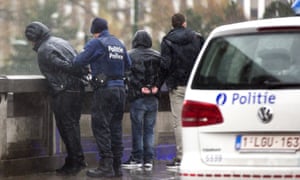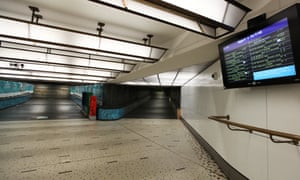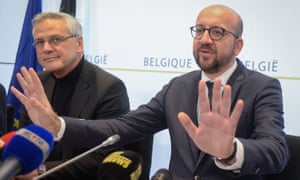Brussels has been blanketed with security after the Belgian government raised alert levels on terrorist threats to the maximum, warning of the “serious and imminent” possibility of a Paris-style attack involving firearms and explosives.
The city’s metro system was closed down on Saturday until Sunday afternoon at the earliest as shops shut, shopping malls were partly shuttered, professional football was cancelled, concerts were called off and music venues, museums, and galleries closed their doors for the weekend.
 The heightened alert level followed meetings of the national security
and counter-terror services late on Friday, which concluded, on the
basis of undisclosed evidence, that a major attack was being planned in
Brussels. The rest of the country was put on a level three alert, one
level short of the maximum.
The heightened alert level followed meetings of the national security
and counter-terror services late on Friday, which concluded, on the
basis of undisclosed evidence, that a major attack was being planned in
Brussels. The rest of the country was put on a level three alert, one
level short of the maximum.
The measures are thought to have been implemented over fears that Salah Abdeslam is hiding in the Brussels area. The 26-year-old Frenchman is believed to be one of the ringleaders of the Paris attacks in which 130 people died last Friday. He has reportedly been in touch with friends on Skype asking for help in getting back to Syria.
“Following a new assessment, the terror alert level has been raised to level four, very serious, for the Brussels region,” said a government statement. “Analysis shows a serious and imminent threat that requires taking specific security measures as well as specific recommendations for the public.”
People were told to avoid rail stations and airports, shopping centres, concerts, and other public events where people congregate.
“We’re mobilising very strong security capacities,” said Charles Michel, the prime minister. “There’s a threat of attack by several individuals in several places. The [crisis centre] took this decision following information on a risk of attack similar to Paris.”
In sleet and the first freezing temperatures of the winter, the roads remained busy in a city known for traffic congestion. Local supermarkets were as busy as ever on a Saturday afternoon, open-air markets operated normally and were well-attended despite the weather and the worry.
 There was however an edginess in the city’s central shopping area, with
security personnel posted at the doors to shops checking bags and
rucksacks on entry. Many shops and cafes lowered their shutters. By the
afternoon, about half of city-centre shops had closed , while armoured
personnel carriers restricted movement in the old city centre
There was however an edginess in the city’s central shopping area, with
security personnel posted at the doors to shops checking bags and
rucksacks on entry. Many shops and cafes lowered their shutters. By the
afternoon, about half of city-centre shops had closed , while armoured
personnel carriers restricted movement in the old city centre
It is well-known that Belgium supplies by far the most foreign fighters to Syria compared to other EU countries in per capita terms and that Molenbeek is where they are concentrated. Jan Jambon, the interior minister and a Flemish nationalist, said that of 130 foreign fighters who were known to have come home from Syria, 85 were living in the small Brussels borough of Molenbeek just west of the city centre. He demanded that the local authorities conduct a “door-by-door” vetting of who was living in every house and flat in the borough.
The mayors of Brussels’ 19 boroughs met at least twice and recommended a thorough lockdown of the city, not all of which was observed. A city centre mayor announced that a popular local market had been cancelled. In fact, it was operating as normal.
Municipal facilities across the city, such as sports and arts centres, libraries, and swimming pools, were all ordered to close. The Sunday morning market at the Gare du Midi, the Eurostar terminal – one of the biggest outdoor markets in Europe – was called off.
It appeared many of the cancellations and closures were meant to relieve pressure on the security forces who would be stretched too thin if mobilised to cover public events. Armed police as well as army personnel patrolled the central streets on foot, while police vehicles were ubiquitous.
 Brussels is home to Nato headquarters and the US embassy in the city advised Americans to cancel their weekend plans.
Brussels is home to Nato headquarters and the US embassy in the city advised Americans to cancel their weekend plans.
“Shelter in place and remain at home. If you must go out, avoid large crowds. US citizens are urged to avoid public places such as major pedestrian walkways and shopping centres. If you were planning to attend an event, we strongly urge you to reconsider. Exercise caution in public transportation systems, sporting events, residential areas, business offices, hotels, clubs, restaurants, places of worship, schools, public areas, shopping malls and other tourist destinations.”
The Foreign office delivered similar advice for the high numbers of Britons in Brussels.
The city’s metro system was closed down on Saturday until Sunday afternoon at the earliest as shops shut, shopping malls were partly shuttered, professional football was cancelled, concerts were called off and music venues, museums, and galleries closed their doors for the weekend.
 The heightened alert level followed meetings of the national security
and counter-terror services late on Friday, which concluded, on the
basis of undisclosed evidence, that a major attack was being planned in
Brussels. The rest of the country was put on a level three alert, one
level short of the maximum.
The heightened alert level followed meetings of the national security
and counter-terror services late on Friday, which concluded, on the
basis of undisclosed evidence, that a major attack was being planned in
Brussels. The rest of the country was put on a level three alert, one
level short of the maximum.The measures are thought to have been implemented over fears that Salah Abdeslam is hiding in the Brussels area. The 26-year-old Frenchman is believed to be one of the ringleaders of the Paris attacks in which 130 people died last Friday. He has reportedly been in touch with friends on Skype asking for help in getting back to Syria.
“Following a new assessment, the terror alert level has been raised to level four, very serious, for the Brussels region,” said a government statement. “Analysis shows a serious and imminent threat that requires taking specific security measures as well as specific recommendations for the public.”
People were told to avoid rail stations and airports, shopping centres, concerts, and other public events where people congregate.
“We’re mobilising very strong security capacities,” said Charles Michel, the prime minister. “There’s a threat of attack by several individuals in several places. The [crisis centre] took this decision following information on a risk of attack similar to Paris.”
In sleet and the first freezing temperatures of the winter, the roads remained busy in a city known for traffic congestion. Local supermarkets were as busy as ever on a Saturday afternoon, open-air markets operated normally and were well-attended despite the weather and the worry.
 There was however an edginess in the city’s central shopping area, with
security personnel posted at the doors to shops checking bags and
rucksacks on entry. Many shops and cafes lowered their shutters. By the
afternoon, about half of city-centre shops had closed , while armoured
personnel carriers restricted movement in the old city centre
There was however an edginess in the city’s central shopping area, with
security personnel posted at the doors to shops checking bags and
rucksacks on entry. Many shops and cafes lowered their shutters. By the
afternoon, about half of city-centre shops had closed , while armoured
personnel carriers restricted movement in the old city centreIt is well-known that Belgium supplies by far the most foreign fighters to Syria compared to other EU countries in per capita terms and that Molenbeek is where they are concentrated. Jan Jambon, the interior minister and a Flemish nationalist, said that of 130 foreign fighters who were known to have come home from Syria, 85 were living in the small Brussels borough of Molenbeek just west of the city centre. He demanded that the local authorities conduct a “door-by-door” vetting of who was living in every house and flat in the borough.
The mayors of Brussels’ 19 boroughs met at least twice and recommended a thorough lockdown of the city, not all of which was observed. A city centre mayor announced that a popular local market had been cancelled. In fact, it was operating as normal.
Municipal facilities across the city, such as sports and arts centres, libraries, and swimming pools, were all ordered to close. The Sunday morning market at the Gare du Midi, the Eurostar terminal – one of the biggest outdoor markets in Europe – was called off.
It appeared many of the cancellations and closures were meant to relieve pressure on the security forces who would be stretched too thin if mobilised to cover public events. Armed police as well as army personnel patrolled the central streets on foot, while police vehicles were ubiquitous.
 Brussels is home to Nato headquarters and the US embassy in the city advised Americans to cancel their weekend plans.
Brussels is home to Nato headquarters and the US embassy in the city advised Americans to cancel their weekend plans.“Shelter in place and remain at home. If you must go out, avoid large crowds. US citizens are urged to avoid public places such as major pedestrian walkways and shopping centres. If you were planning to attend an event, we strongly urge you to reconsider. Exercise caution in public transportation systems, sporting events, residential areas, business offices, hotels, clubs, restaurants, places of worship, schools, public areas, shopping malls and other tourist destinations.”
The Foreign office delivered similar advice for the high numbers of Britons in Brussels.
Δεν υπάρχουν σχόλια:
Δημοσίευση σχολίου